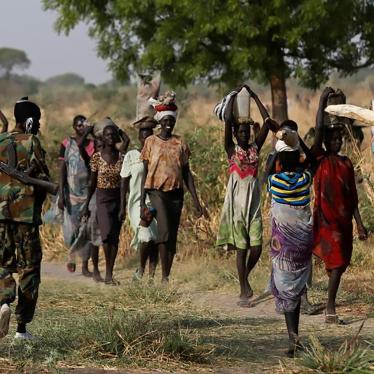UPDATE: On July 13, 2018, the UN Security Council voted to adopt a resolution extending the sanctions regime in South Sudan, imposing sanctions on two additional individuals and for the first time imposing a globally enforceable arms embargo on weapons sales and transfers to the country.
(New York, July 12, 2018) - “How can I forget the sight of an old man whose throat was slit with a knife before being set afire?” a 14-year-old girl was quoted as saying in a new United Nations report, laying bare the suffering of South Sudan’s civilians at the hands their own government.
The report, by the Office of the High Commissioner for Human Rights and the UN peacekeeping mission in South Sudan (UNMISS), documents murder, rape, and other abuses by South Sudan’s soldiers and armed groups during an April-May military campaign in southern Unity state.
This new information underlines the need for the UN Security Council, which meets tomorrow, to finally level an arms embargo against South Sudan.
Many abuses in the report appear to be war crimes, and are consistent with previous abuses perpetrated during offensives documented by Human Rights Watch. In one attack, a 20-year-old woman – who had delivered a baby just three days earlier – described being raped by a government soldier.
In late May, a frustrated Security Council sent a powerful warning to the warring parties. Extending the UN sanctions regime, the council also said it would impose further sanctions and an arms embargo by July if the fighting between the parties continued and there was still no viable political agreement.
Fast forward to late June, when South Sudan’s leaders – under increasing pressure from the international community – signed another peace deal to end the nearly five-year long war. However, as has happened before, the parties broke the ceasefire within hours of signing it. Moreover, a June 29 letter to the council’s president from the UN secretary-general said the peacekeeping mission had documented “gross violations” in June.
Now, the Security Council has an opportunity to turn its warnings into decisive action. It should impose both individual sanctions and a long overdue arms embargo on the country, which through reducing the flow of weapons can mitigate risk of harm to civilians.
Instead of being drawn in by the latest political maneuvers from South Sudanese leaders, the council should address the suffering of South Sudan’s civilians. They’re the ones who need an arms embargo now.








